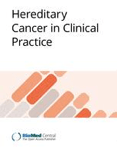
Hereditary Cancer in Clinical Practice
Scope & Guideline
Exploring Genetic Pathways to Enhance Clinical Practice
Introduction
Aims and Scopes
- Hereditary Cancer Syndromes Research:
The journal emphasizes research on various hereditary cancer syndromes, such as Lynch syndrome, BRCA1/2 mutations, and Li-Fraumeni syndrome, providing insights into genetic predispositions and their implications for cancer risk. - Clinical Management Strategies:
It covers methodologies for the clinical management of hereditary cancers, including risk assessment, screening protocols, and treatment options tailored to genetic profiles. - Patient Experiences and Psychosocial Aspects:
The journal explores the psychosocial impacts of hereditary cancer diagnoses on patients and families, focusing on their experiences, emotional responses, and the decision-making processes regarding genetic testing and preventive measures. - Genetic Testing and Screening Innovations:
A significant focus is on advancements in genetic testing techniques, including next-generation sequencing and population-based screening strategies, to better identify individuals at risk. - International Perspectives and Guidelines:
The journal includes contributions on international guidelines and practices in hereditary cancer management, fostering a global dialogue on best practices and emerging trends.
Trending and Emerging
- Multimodal Approaches to Treatment:
There is a growing trend towards exploring multimodal treatment strategies that combine genetic insights with advanced therapeutic options, such as targeted therapies and immunotherapy for hereditary cancers. - Patient-Centric Research:
An increase in studies focusing on patient experiences, preferences, and psychosocial factors related to genetic testing and cancer prevention strategies highlights a shift towards more patient-centered research. - Integration of Telemedicine in Genetic Services:
The incorporation of telemedicine for genetic counseling and follow-up care has emerged as a significant theme, especially in the context of the COVID-19 pandemic, indicating a shift towards accessible healthcare solutions. - Emerging Genetic Testing Technologies:
Innovations in genetic testing technologies, such as liquid biopsies and expanded gene panels, are increasingly featured, reflecting the rapid evolution of genetic diagnostics and their application in clinical practice. - Focus on Minority and Diverse Populations:
There is a notable rise in research addressing hereditary cancer risks in diverse populations, emphasizing the importance of understanding genetic variations and cancer risks across different ethnic groups.
Declining or Waning
- General Cancer Epidemiology Studies:
The journal has seen a decrease in publications that focus solely on general cancer epidemiology without a hereditary context, as the emphasis shifts towards hereditary-specific research. - Traditional Risk Factor Assessments:
There has been a decline in studies that focus on traditional lifestyle-related risk factors (like diet and exercise) in the context of hereditary cancers, as the field moves towards more genetic and molecular insights. - Single Pathogenetic Variant Studies:
Research centered on the implications of single genetic variants without broader context or comprehensive genetic testing approaches is becoming less common, with a preference for studies that consider multiple genetic factors.
Similar Journals

World Journal of Clinical Oncology
Advancing the Future of Oncology ResearchWorld Journal of Clinical Oncology, published by BAISHIDENG PUBLISHING GROUP INC, stands as a vital resource in the realm of oncology, providing a dedicated platform for the dissemination of cutting-edge research and clinical advancements. With an ISSN of 2218-4333, this journal facilitates a comprehensive exploration of modern oncology challenges and breakthroughs, targeting researchers, healthcare professionals, and students alike. Although it operates under the traditional subscription model, the impactful nature of its content is reflected in its notable ranking of 60 out of 334 in the category of Medicine _ Oncology, placing it in the 82nd percentile among peer publications. Covering significant topics in clinical oncology from 2014 to 2018, the journal has been instrumental in addressing evolving oncology practices and patient care innovations. By publishing high-quality studies, it remains an essential tool for advancing knowledge and fostering collaboration within the global oncology community.
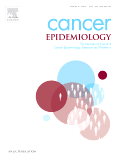
Cancer Epidemiology
Bridging Gaps in Cancer ResearchCancer Epidemiology, published by ELSEVIER SCI LTD, serves as a premier platform for disseminating innovative research in the areas of cancer epidemiology and oncology. Operating from the Netherlands, this journal provides a critical insight into the factors influencing cancer incidence, including genetic, environmental, and lifestyle variables. With an impact factor reflecting its significance in the field, it holds a respectable Q2 ranking in Cancer Research, Epidemiology, and Oncology. The journal spans a wide range of topics and publishes studies that aim to bridge gaps in existing literature through rigorous research methodologies. Researchers and professionals interested in acquiring the latest insights and contributing to the evolving discourse on cancer epidemiology will find this journal an invaluable resource. Access to articles may be available through open access options, ensuring the widest dissemination of knowledge.

Current Genetic Medicine Reports
Fostering Global Collaboration in Genetic ResearchCurrent Genetic Medicine Reports, published by SPRINGERNATURE, is a prominent journal dedicated to advancing the field of genetic medicine. With an emphasis on the latest research and advancements, this journal serves as a critical platform for disseminating high-quality original articles, reviews, and reports that focus on the application of genetic information in various medical disciplines. As an open-access journal, it ensures that valuable findings are freely accessible to a global audience, thereby fostering collaboration and innovation among researchers, healthcare professionals, and students alike. Although the journal does not yet have an established impact factor, its commitment to rigorous peer review and its contributions to the understanding and integration of genetic medicine into clinical practice enhance its scholarly significance. The editorial board is comprised of leading experts, encouraging submissions that tackle contemporary issues in genetic research and its clinical applications. Located in London, England, this journal is poised to be a vital resource for those seeking to stay abreast of the rapid changes in the dynamic field of genetic medicine.

Journal of Cancer
Connecting researchers to transform cancer care.Journal of Cancer is a premier, peer-reviewed academic journal published by IVYSPRING INTERNATIONAL PUBLISHING that focuses on advancing the field of oncology. With an impact factor reflecting its significant contributions, this journal ranks in the 80th percentile of medical journals pertaining to oncology, positioning it at #79 out of 404 in Scopus. Since its inception in 2010, the journal has embraced an Open Access model, ensuring that groundbreaking research reaches a global audience without barriers. Based in Australia, the journal addresses a wide array of topics within cancer research, catering to researchers, healthcare professionals, and students committed to enhancing their understanding of the complexities of cancer. Amidst evolving challenges in oncology, the Journal of Cancer serves as a vital platform for disseminating innovative findings, fostering collaboration, and promoting informed decisions that can lead to improved cancer outcomes worldwide.

INTERNATIONAL JOURNAL OF HUMAN GENETICS
Fostering Dialogue in the World of GeneticsINTERNATIONAL JOURNAL OF HUMAN GENETICS is a distinguished publication dedicated to advancing knowledge in the fields of genetics and molecular biology. Published by KAMLA-RAJ ENTERPRISES, this journal explores critical developments and research findings from 2008 to 2016, though its coverage in Scopus has since been discontinued. With an ISSN of 0972-3757 and an E-ISSN of 2456-6330, the journal aimed to foster scholarly dialogue and serve as a resource for researchers, professionals, and students engaged in human genetics. While the journal holds a modest ranking in categories such as Biochemistry and Genetics, it remains a vital source for exploring niche topics within the realm of human genetics. Researchers interested in genetic screening, gene therapy, and clinical genetics will find valuable insights herein. Despite its pause in indexing, the journal continues to contribute to the academic discourse by disseminating critical research that bridges gaps in understanding human genetics.
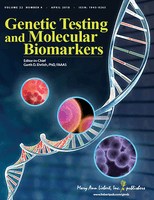
Genetic Testing and Molecular Biomarkers
Catalyzing Innovation in Genetic Research and Clinical Practice.Genetic Testing and Molecular Biomarkers, an esteemed journal published by MARY ANN LIEBERT, INC, serves as a pivotal platform for advancing the field of genetic research and its applications in medicine. Focused on the innovative intersections of genetics and biomarker discovery, this journal has consistently contributed meaningful insights since its inception in 2009, with its scope evolving through 2024. With an ISSN of 1945-0265 and an E-ISSN of 1945-0257, it offers both traditional and open access options to cater to a broad audience of researchers, professionals, and students. Despite its current classification in the Q4 and Q3 quartiles for Genetics (clinical) and Medicine (miscellaneous) respectively, the journal remains committed to publishing high-quality, peer-reviewed articles that push the boundaries of knowledge in the field. As the landscape of genomic medicine continues to expand, Genetic Testing and Molecular Biomarkers is positioned as a crucial resource for disseminating cutting-edge discoveries and fostering interdisciplinary collaboration.
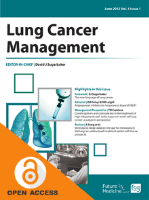
Lung Cancer Management
Leading the Charge in Lung Cancer Research and ManagementLung Cancer Management, published by FUTURE MEDICINE LTD, is a premier academic journal dedicated to the evolving field of oncology and respiratory medicine. With an ISSN of 1758-1966 and an E-ISSN of 1758-1974, this journal offers a platform for the dissemination of cutting-edge research, clinical studies, and expert reviews, all focusing on the latest advances in lung cancer treatment and management. Despite being a relatively new entry since its inception in 2014 and achieving its converged years from 2020 to 2024, it has already established itself in the Q3 quartile for both oncology and pulmonary and respiratory medicine as of 2023, according to category quartiles rankings. With a Scopus ranking of #98 in the category of Pulmonary and Respiratory Medicine and #266 in Oncology, the journal reflects a commitment to quality and relevance in its content. Although it does not offer open access, it remains a crucial resource for researchers, clinicians, and students seeking to stay informed about the latest developments and practical approaches in lung cancer management. The journal is accessible from its base in the United Kingdom, at UNITEC HOUSE, 3RD FLOOR, 2 ALBERT PLACE, FINCHLEY CENTRAL, LONDON N3 1QB, ensuring that it caters to a global audience eager to explore and contribute to this vital field of medicine.

Familial Cancer
Empowering researchers with cutting-edge findings.Familial Cancer is a premier journal dedicated to advancing the understanding of hereditary cancer, published by Springer. With an ISSN of 1389-9600 and E-ISSN 1573-7292, this journal serves as an essential platform for researchers and clinicians focused on the genetic predispositions to cancer and the implications for patient care. Since its inception in 2001, Familial Cancer has built a strong reputation, being consistently ranked in the Q2 category across several key research areas including Cancer Research, Genetics, and Oncology. As of 2023, it holds significant Scopus rankings, reflecting its impactful contributions in the fields of Medicine and Genetics, with a focus on clinical applications. The journal does not currently offer Open Access, emphasizing the commitment to rigorous peer review and high-quality publications. It is vital for emerging researchers and seasoned professionals alike, providing insights into the hereditary aspects of cancer and fostering developments that can lead to better prevention and therapeutic strategies.

JOURNAL OF PEDIATRIC ENDOCRINOLOGY & METABOLISM
Exploring Breakthroughs in Endocrinology and MetabolismThe JOURNAL OF PEDIATRIC ENDOCRINOLOGY & METABOLISM, published by Walter de Gruyter GmbH, is a reputable peer-reviewed journal dedicated to advancing the field of pediatric endocrinology and metabolism. Since its inception in 1985, this journal has become a vital resource for professionals and researchers, providing insights into the latest advancements, clinical practices, and foundational research in the care of children with endocrine disorders. With a noted Q3 ranking in Endocrinology, Diabetes and Metabolism, and a robust focus on Pediatrics, Perinatology, and Child Health, it addresses important topics such as hormonal imbalances and metabolic syndromes in young populations. Despite its non-open access status, it continues to play an essential role in bridging the knowledge gap within our understanding of children's health and disease, contributing significantly to the progress in this specialized field.
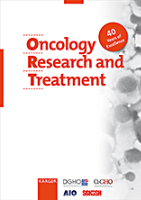
Oncology Research and Treatment
Shaping the landscape of cancer treatment and research.Oncology Research and Treatment, published by KARGER, is a highly regarded academic journal dedicated to advancing the field of oncology through rigorous research and clinical insights. With a history spanning from 1978 to 1997 and continuing from 2013 to 2024, this journal provides a vital platform for researchers and professionals in cancer research, hematology, and related disciplines. Though currently listed in the Q3 tier of 2023 for Cancer Research, Hematology, and Oncology, its growing readership and open access policy enhance its visibility and impact within the scientific community. Based in Switzerland, the journal features diverse access options, reflecting the global importance of oncology research. With a focus on innovative treatments and the latest methodologies, Oncology Research and Treatment plays a crucial role in fostering collaboration and dialogue among researchers, professionals, and students alike, helping to shape the future of cancer care and management.